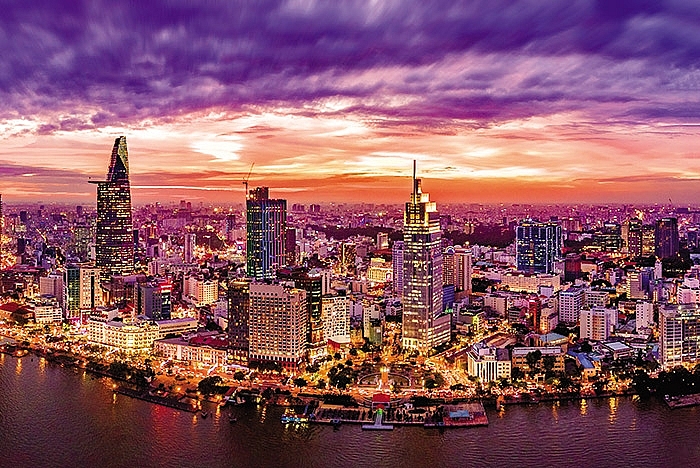Learning global lessons in smart city creation
 |
| By Tomaso Andreatta Vice chairman, Eurocham |
All of humanity is gradually concentrating in cities. In countries like Vietnam, with a youthful population and with recent experience of getting out of poverty, these tend to be fast-growing megacities of many millions of people. Today, more than ever, opportunities for employment, business, education, health, entertainment, shopping, and real estate investment are concentrated in cities.
The connectivity among cities, both in terms of the physical moving of people and goods and data and information, is increasing fast. Many cities have a wide network of relations with peers around the world, not necessarily in the same country or region. The criteria for these links are mostly similarities in the structure, size, and leadership in solutions achieved.
Devolution, whereby more responsibility is given to the institutions closest to the people they cater for, ensures that a greater share of revenue generated by cities stays there. However, this imposes a heavier financial burden on cities.
Cities are the places where people live but also the base of most economic activity, especially services and knowledge management firms. So, developing entrepreneur-friendly cities, and ones that help the circular economy – the gradual but total elimination of waste through reuse and recycling – are ever more conscious goals for every city’s government.
With climate change and cities affecting their own microclimate, cities are increasingly responsible for facing environmental challenges.
To all Europeans, the principal purpose of a city being smart is to become more liveable. Europe has one of the highest concentrations of smart cities, and many top-ranking ones by quality and quantity of services offered. This is mostly due to the culture of service to the citizen that European cities have developed through their unique history. Consider the city-states of the middle ages, especially in Italy, and the very word “citizen,” meaning someone who lives in the city.
 |
| Ho Chi Minh City has a world of knowledge to draw on for its digital transformation |
Smart cities use technology and the data sharing that technology allows to find many different and sometimes competing solutions to old and new problems of so many people living together in a small space with limited resources.
Specifically, relevant technologies are the Internet of Things (IoT), Big Data, Artificial Intelligence, and apps for increasingly ubiquitous smartphones that enable citizens to interact with data and information. Key enabling infrastructure then becomes Internet lines with large capacity and Wi-Fi points throughout the city.
It is not necessary for the city to develop all applications and systems for the management of flows and services, as open-sourcing allows the market to generate many competing solutions that keep being improved at no cost. Technology enables the management of space and resources in a more dynamic and timely manner.
The areas where smart cities have so far developed the most are in trying to reduce traffic and emissions; improve energy efficiency; manage water and waste; enhance emergency services, healthcare, and hospitals; and better city governance, opening up the city for more competitiveness, knowledge sharing, and a higher quality of life.
Of course, one of the earliest applications was simplifying the interaction between the citizen and the city, creating a single point of contact for all services and certificates, bringing them online, and simplifying proof of identity. In general, the convergence of data from different sources into a database allows for new types of analysis and solutions.
Interaction and e-payment in traffic tickets tend to reduce administrative costs and especially the possibility of personal interest abuse. A very promising area of citizen-city interaction for development in a smart direction is in land registry. With satellite and drone images, it is easy to have real-time 3D images of buildings and land that can be digitally matched with land rights and permissions received.
One European example that Vietnam could follow comes from the Netherlands. Amsterdam has chosen to be an innovation centre and reports in real-time new solutions so that all stakeholders can take advantage and further improve. Traffic management, with the use of traffic lights and real-time advice to drivers on which roads to take, is a co-operation of city and private providers.
Citi-Zen is another project that combines rooftop solar energy – which is much more powerful in the south of Vietnam – and energy-efficiency measures for heating, air conditioning, and lighting. Together with several other cities, it is a member of Connected Urban Development and The Climate Group to share best practices. The key element of success is the co-operation of the city, companies, dedicated startups, and non-governmental organisations. Amsterdam’s exceptional Internet speed and capacity has attracted many world-leading IT companies.
Barcelona, known as the mobile capital of the world, started with a backbone of 500 kilometres of fibre-optic cables to integrate data, which allows to offer free Wi-Fi everywhere. A second priority was open government and open data, then energy efficiency in buildings with solar panels and sharing of heating and water between buildings.
Street lighting is centrally co-ordinated to reduce cost and waste management supported by sensors in each garbage bin. Parking lots with sensors allow drivers to know where it is possible to leave the car nearby, avoiding the need to circle around to search for one. Bus routes have been redesigned thanks to sensors and achieved a 30 per cent increase in rides in four years. Free bicycles with sensors to report traffic, pollution, and other data, and a GPS to avoid stealing, are available in various locations, while an app finds the best route for drivers and public transport has its own. Tourists may upload an image of where they are to be given information about that site.
Copenhagen aims to become carbon neutral by 2025 and eventually zero carbon. It pilots several projects of IoT together with companies, helping them to come to market with new solutions. One of the most interesting projects is EnergyBlock, a blockchain technology system for decentralised energy solutions. It works with Singapore on exchanging information on its solutions. It has adopted a complex plan to deal with climate change thanks to digital information and this involves the diffusion of smart buildings.
Tallinn, the capital of Estonia, involves its citizens directly and has even carried out a referendum on free local transport paid for by car parking fees. It has applied smart city solutions to traffic, from putting all street works on the Internet to immigration and to company clusters. It manages the land registry almost entirely online.
Many Vietnamese cities, especially Ho Chi Minh City, Hanoi, Danang, and Binh Duong, are very much active in developing smart solutions, partnering with world-leading companies providing IT and telecom solutions, joining international networks of cities to share best practices, nominating people and departments to be responsible for moving forward, and some have supported startup incubators. The first areas of action are generally traffic and citizen relations.
If there is some advice to give to Vietnamese cities on building smart cities, it is to rely even more on open data and a system that includes a large variety of companies to spontaneously develop solutions and offer them to the market, while of course having a clear strategy for its own areas of responsibility and taking leadership in identifying priorities for investment and services to the citizen.
EuroCham is actively working to help Vietnamese cities become smarter, through its smart city meetings with the Ho Chi Minh City authorities, and the activities of its Mobility, ICT, and Green Growth Sector committees looking at traffic, data, air quality, energy efficiency, as well as the participation of our co-chairman in the special task force reporting to the prime minister on technology.
What the stars mean:
★ Poor ★ ★ Promising ★★★ Good ★★★★ Very good ★★★★★ Exceptional
 Tag:
Tag:
Related Contents
Latest News
More News
- State corporations poised to drive 2026 growth (February 03, 2026 | 13:58)
- Why high-tech talent will define Vietnam’s growth (February 02, 2026 | 10:47)
- FMCG resilience amid varying storms (February 02, 2026 | 10:00)
- Customs reforms strengthen business confidence, support trade growth (February 01, 2026 | 08:20)
- Vietnam and US to launch sixth trade negotiation round (January 30, 2026 | 15:19)
- Digital publishing emerges as key growth driver in Vietnam (January 30, 2026 | 10:59)
- EVN signs key contract for Tri An hydropower expansion (January 30, 2026 | 10:57)
- Vietnam to lead trade growth in ASEAN (January 29, 2026 | 15:08)
- Carlsberg Vietnam delivers Lunar New Year support in central region (January 28, 2026 | 17:19)
- TikTok penalised $35,000 in Vietnam for consumer protection violations (January 28, 2026 | 17:15)






















 Mobile Version
Mobile Version